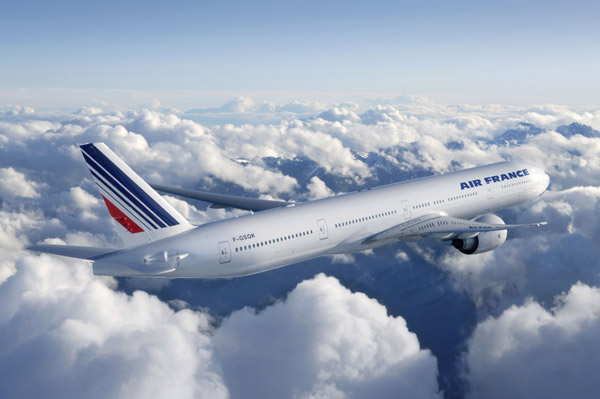Korean investors to fund Air France’s plane lease with $34 mn mezzanine loan
Oct 26, 2016 (Gmt+09:00)
2
Min read
Most Read
LG Chem to sell water filter business to Glenwood PE for $692 million


Kyobo Life poised to buy Japan’s SBI Group-owned savings bank


KT&G eyes overseas M&A after rejecting activist fund's offer


StockX in merger talks with Naver’s online reseller Kream


Mirae Asset to be named Korea Post’s core real estate fund operator


The Public Officials Benefit Association (POBA) and the Yellow Umbrella Mutual Aid will invest $34 million in mezzanine debt to fund Air France’s $115.7 million lease of a Boeing aircraft, to become the first South Korean institutions to participate in a major European airline’s plane funding.
The financing of the Boeing 777-300ER model comprises equity, senior and mezzanine tranches, according to investment banking sources on Oct. 25. European banks will invest in equity and senior debt financing, while the POBA and the savings fund for small business owners purchase the whole mezzanine tranche. In return, the two Korean funds will receive a fixed annual return at the upper end of the 5% range for seven years to maturity, backed by the fuselage, engines and lease payments.

The 777-300ER is a best-selling, large airplane model, so it is viewed as liquid asset. A total of 796 planes of the model have been ordered so far, with 36 airlines using them. But the Airbus A380, which domestic investors had concentrated on for aviation financing, were leased to only a few airline companies including Emirates Airline.
Return conditions attached to the Air France’s lease contract – the “full life” status – is another merit of the investment. Under the conditions, Air France should return the aircraft after the lease contract ends as it used to be when it was first delivered. By comparison, aircraft fund investors generally shouldered $20 million~$30 million in maintenance fees after the airplane was returned, under the “minimum condition” agreement.
Further, the mezzanine lending by the two funds extended domestic institutions’ portfolio of aviation funding beyond the Middle East. South Korean institutional investors, including the National Pension Service, are looking to diversify into new alternative asset classes and new regions, after competition for conventional alternative assets in developed economies has pushed their prices sharply higher.
“(We) differentiated this from previous ones by preparing an investment safety net such as high-level return conditions,” said Jung-won Kang of Dongbu Securities which arranged the aircraft funding for Air France. “It spurred strong interest from institutional investors in search of long-term, steady yields.”
Air France, the largest European airline company, is a wholly-owned subsidiary of the Air France-KLM Group. It carries about 80 million passengers a year, and flies to 320 cities in 114 countries. The French government has a 17.6% stake in Air France.
By Ki-yeol Seo, Daehun Kim and Donhun Lee
philos@hankyung.com
The financing of the Boeing 777-300ER model comprises equity, senior and mezzanine tranches, according to investment banking sources on Oct. 25. European banks will invest in equity and senior debt financing, while the POBA and the savings fund for small business owners purchase the whole mezzanine tranche. In return, the two Korean funds will receive a fixed annual return at the upper end of the 5% range for seven years to maturity, backed by the fuselage, engines and lease payments.

The 777-300ER is a best-selling, large airplane model, so it is viewed as liquid asset. A total of 796 planes of the model have been ordered so far, with 36 airlines using them. But the Airbus A380, which domestic investors had concentrated on for aviation financing, were leased to only a few airline companies including Emirates Airline.
Return conditions attached to the Air France’s lease contract – the “full life” status – is another merit of the investment. Under the conditions, Air France should return the aircraft after the lease contract ends as it used to be when it was first delivered. By comparison, aircraft fund investors generally shouldered $20 million~$30 million in maintenance fees after the airplane was returned, under the “minimum condition” agreement.
Further, the mezzanine lending by the two funds extended domestic institutions’ portfolio of aviation funding beyond the Middle East. South Korean institutional investors, including the National Pension Service, are looking to diversify into new alternative asset classes and new regions, after competition for conventional alternative assets in developed economies has pushed their prices sharply higher.
“(We) differentiated this from previous ones by preparing an investment safety net such as high-level return conditions,” said Jung-won Kang of Dongbu Securities which arranged the aircraft funding for Air France. “It spurred strong interest from institutional investors in search of long-term, steady yields.”
Air France, the largest European airline company, is a wholly-owned subsidiary of the Air France-KLM Group. It carries about 80 million passengers a year, and flies to 320 cities in 114 countries. The French government has a 17.6% stake in Air France.
By Ki-yeol Seo, Daehun Kim and Donhun Lee
philos@hankyung.com
Yeonhee Kim edited this article
More to Read
-
 Real estateMirae Asset to be named Korea Post’s core real estate fund operator
Real estateMirae Asset to be named Korea Post’s core real estate fund operatorApr 29, 2025 (Gmt+09:00)
-
 Asset managementMirae Asset bets on China as Korean investors’ US focus draws concern
Asset managementMirae Asset bets on China as Korean investors’ US focus draws concernApr 27, 2025 (Gmt+09:00)
-
 Alternative investmentsMeritz backs half of ex-manager’s $210 mn hedge fund
Alternative investmentsMeritz backs half of ex-manager’s $210 mn hedge fundApr 23, 2025 (Gmt+09:00)
-
 Real estateRitz-Carlton to return to Seoul, tapped by IGIS Asset for landmark project
Real estateRitz-Carlton to return to Seoul, tapped by IGIS Asset for landmark projectApr 22, 2025 (Gmt+09:00)
-
 Real estateS.Korean gaming giant Netmarble eyes headquarters building sale
Real estateS.Korean gaming giant Netmarble eyes headquarters building saleApr 18, 2025 (Gmt+09:00)
Comment 0
LOG IN


